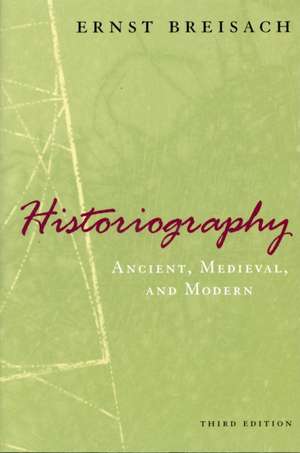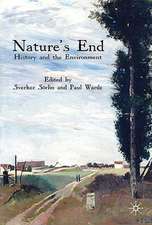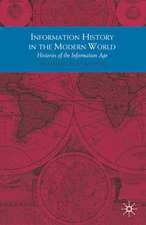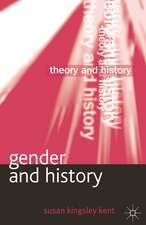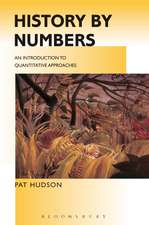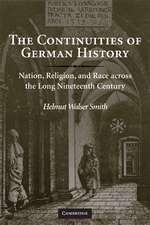Historiography: Ancient, Medieval, and Modern, Third Edition
Autor Ernst Breisachen Limba Engleză Paperback – 30 dec 2007
In this pioneering work, Ernst Breisach presents an effective, well-organized, and concise account of the development of historiography in Western culture. Neither a handbook nor an encyclopedia, this up-to-date third edition narrates and interprets the development of historiography from its origins in Greek poetry to the present, with compelling sections on postmodernism, deconstructionism, African-American history, women’s history, microhistory, the Historikerstreit, cultural history, and more. The definitive look at the writing of history by a historian, Historiography provides key insights into some of the most important issues, debates and innovations in modern historiography.
Praise for the first edition: “Breisach’s comprehensive coverage of the subject and his clear presentation of the issues and the complexity of an evolving discipline easily make his work the best of its kind.”—Lester D. Stephens, American Historical Review
Praise for the first edition: “Breisach’s comprehensive coverage of the subject and his clear presentation of the issues and the complexity of an evolving discipline easily make his work the best of its kind.”—Lester D. Stephens, American Historical Review
Toate formatele și edițiile
| Toate formatele și edițiile | Preț | Express |
|---|---|---|
| Paperback (1) | 218.48 lei 3-5 săpt. | +27.22 lei 6-12 zile |
| University of Chicago Press – 30 dec 2007 | 218.48 lei 3-5 săpt. | +27.22 lei 6-12 zile |
| Hardback (1) | 594.39 lei 6-8 săpt. | |
| University of Chicago Press – 30 dec 2007 | 594.39 lei 6-8 săpt. |
Preț: 218.48 lei
Nou
Puncte Express: 328
Preț estimativ în valută:
41.81€ • 45.55$ • 35.23£
41.81€ • 45.55$ • 35.23£
Carte disponibilă
Livrare economică 03-17 aprilie
Livrare express 19-25 martie pentru 37.21 lei
Preluare comenzi: 021 569.72.76
Specificații
ISBN-13: 9780226072838
ISBN-10: 0226072835
Pagini: 500
Ilustrații: black & white illustrations, figures
Dimensiuni: 152 x 229 x 30 mm
Greutate: 0.71 kg
Ediția:Third Edition
Editura: University of Chicago Press
Colecția University of Chicago Press
ISBN-10: 0226072835
Pagini: 500
Ilustrații: black & white illustrations, figures
Dimensiuni: 152 x 229 x 30 mm
Greutate: 0.71 kg
Ediția:Third Edition
Editura: University of Chicago Press
Colecția University of Chicago Press
Notă biografică
Ernst Breisach is professor emeritus of history at Western Michigan University and the author of several books, including American Progressive History: An Experiment in Modernization and On the Future of History: The Postmodernist Challenge and Its Aftermath, both published by the University of Chicago Press.
Cuprins
Preface
Introduction
1
The Emergence of Greek Historiography
2
The Era of the Polis and Its Historians
3
Reaching the Limits of Greek Historiography
4
Early Roman Historiography: Myths, Greeks, and the Republic
5
Historians and the Republic’s Crisis
6
Perceptions of the Past in Augustan and Imperial Rome
7
The Christian Historiographical Revolution
8
The Historiographical Mastery of New Peoples, States, and Dynasties
9
Historians and the Ideal of the Christian Commonwealth
10
Historiography’s Adjustment to Accelerating Change
11
Two Turning Points: The Renaissance and The Reformation
12
The Continuing Modification of Traditional Historiography
13
The Eighteenth-Century Quest for a New Historiography
14
Three National Responses
15
Historians as Interpreters of Progress and Nation—1
16
Historians as Interpreters of Progress and Nation—2
17
A First Prefatory Note to Modern Historiography
Introduction
1
The Emergence of Greek Historiography
2
The Era of the Polis and Its Historians
3
Reaching the Limits of Greek Historiography
4
Early Roman Historiography: Myths, Greeks, and the Republic
5
Historians and the Republic’s Crisis
6
Perceptions of the Past in Augustan and Imperial Rome
7
The Christian Historiographical Revolution
8
The Historiographical Mastery of New Peoples, States, and Dynasties
9
Historians and the Ideal of the Christian Commonwealth
10
Historiography’s Adjustment to Accelerating Change
11
Two Turning Points: The Renaissance and The Reformation
12
The Continuing Modification of Traditional Historiography
13
The Eighteenth-Century Quest for a New Historiography
14
Three National Responses
15
Historians as Interpreters of Progress and Nation—1
16
Historians as Interpreters of Progress and Nation—2
17
A First Prefatory Note to Modern Historiography
18
History and the Quest for a Uniform Science
19
The Discovery of Economic Dynamics
20
Historians Encounter the Masses
21
The Problem of World History
22
Historiography Between Two World Wars (1918–39)
The Twentieth-Century Context
Challenges to Historians
Historicism: From Dominance to Crisis
Historians and the War Guilt Debate
23
History Writing in Liberal Democracies (1918–39)
American Historiography after the “Great War”
England: Historiography in a Fading Empire
French Historians: The Revolutionary Tradition and a New Vision of the Past
24
Historiography and the Grand Ideologies
Italian Fascism and historiography (1922–43)
German Historians in the Weimar Republic and Hitler’s Reich
The Soviet Union: The Imagined Future as the Guide for History
25
American Historiography after 1945
New Realities and Traditional Horizons
Historical Repercussions of America’s New Status
Historiography as Call for Reform
26
History in the Scientific Mode
History in the Language of Numbers
Reshaping Economic History
Growing Dissent: Narrativism
Psychohistory: Promise and Problems
27
Transformations in English and French Historiography
Voices in the War Guilt Debate
History Writing in Post-imperial England
Traditional and New French Historical Perspectives
Transformations in English and French Historiography
Voices in the War Guilt Debate
History Writing in Post-imperial England
Traditional and New French Historical Perspectives
28
Marxist Historiography in the Soviet Union and Western Democracies
The Problems and the End of the Soviet Union’s Marxism
Marxist Historical Theory in the West
29
Historiography in the Aftermath of Fascism
Historical Perspectives in Post-war Italy
History for and of a New Germany
30
World History Between Vision and Reality
The Multiple Cultures Model
Progress and Westernization
World System Theories
31
Historiography, Postmodernity and Prospects
Historiographical Adjustments to a Turbulent Context
History and Visions of a Postmodern Future
The New Cultural History
Prospects
